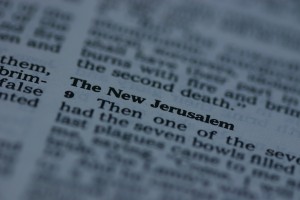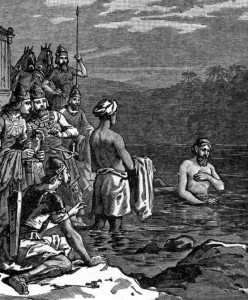
Many Christians believe that we must interpret all passages of Scripture by stressing what they teach us about Jesus. Is this a faithful handling of the text?
I recently had a friend send me an article explaining how we often teach or preach the wrong message when we talk about David and Goliath. I would certainly agree that most people include many misconceptions when sharing this account, such as the idea that David was a little guy, but this article was much different. The article was from Tim Keller, a popular pastor and author, and it advocates what he called a Christo-centric reading of the text. I’m not real familiar with Mr. Keller’s work, so please don’t view this as a commentary on him, his ministry, or his love for the Lord, but rather a critique of the view that he promoted in his article, Moralism vs. Christ-centered Exposition.
The Christo-centric Approach
The so-called Christo-centric approach (or Christ-centered exposition) is nothing new, but it seems to be growing rapidly in its popularity today, and I have many good friends who hold to it. Essentially, this approach makes an effort to connect every passage in the Bible to Jesus. I’ve heard some say that every passage is about Jesus, or that the whole Bible is about Jesus. Some take a slightly more guarded approach and look for foreshadows or types of Christ in each text, and some talk about how it is all one big narrative of redemptive history. This idea actually extends into many disciplines of the Christian life, so I’m sure I won’t be able to address all of it. My focus will be on the interpretive method.
Now, before I go any further, I need to say that I unequivocally believe that Jesus is the central figure and theme in Scripture, and that the Bible from the start points people to the Savior and their need for Him. So, in a sense, it is a narrative of redemptive history, but that is different than saying that the whole Bible is about Him. After all, there are many passages about God the Father and the Holy Spirit as well.

Is the story of Naaman and Elisha really all about Jesus? We need guard against reading our own ideas into the text.
A few years ago, I was discussing this issue with a pastor who holds to this approach. I asked him what the account of Naaman the Syrian was about in 2 Kings 5 (the Syrian military commander who visits Elisha to be cleansed from his leprosy). My friend said something like, “Are you kidding? That’s all about Jesus. A Gentile comes to the Jewish holy man to be cleansed.” I happen to believe the passage is about Naaman the Syrian commander who visits Elisha to be cleansed from his leprosy. Could we draw some parallels to Jesus as my friend has done? Sure, but that is different than saying the text is actually about Jesus. Also, how can we be sure that the parallels we draw are what we are supposed to take from the text, especially since the Bible doesn’t make those parallels for us?
It seems that Tim Keller would agree with my friend. Here is what he said in his article about David and Goliath:
For example, look at the story of David and Goliath. What is the meaning of that narrative for us? Without reference to Christ, the story may be (usually is!) preached as: “The bigger they come, the harder they’ll fall, if you just go into your battles with faith in the Lord. You may not be real big and powerful in yourself, but with God on your side, you can overcome giants.” But as soon as we ask: “how is David foreshadowing the work of his greater Son”? We begin to see the same features of the story in a different light. The story is telling us that the Israelites can not go up against Goliath. They can’t do it. They need a substitute. When David goes in on their behalf, he is not a full-grown man, but a vulnerable and weak figure, a mere boy. He goes virtually as a sacrificial lamb. But God uses his apparent weakness as the means to destroy the giant, and David becomes Israel’s champion-redeemer, so that his victory will be imputed to them. They get all the fruit of having fought the battle themselves.
This is a fundamentally different meaning than the one that arises from the non-Christocentric reading. There is, in the end, only two ways to read the Bible: is it basically about me or basically about Jesus?
I truly appreciate the desire these men have to preach the gospel and to tell people about Jesus Christ. He’s our Creator, Savior, and Lord, and He is worthy of all our praise and worship. Nevertheless, I believe there are some very real problems with the approach, and I have put this off for a while, because it almost sounds heretical to oppose it (what Bible-believing Christian wouldn’t want to talk more about Jesus?). But I think it ultimately does a disservice to the Old Testament and the Bible as a whole. I believe it downplays the significance of the Old Testament text, thus undermining its authority, and misrepresents some of the words of Jesus to support the idea that the Old Testament is really all about Him.
In short, I do not believe the Christo-centric approach faithfully deals with the biblical text, even though I have no doubts that my friends who hold to this view have a deep love and respect for our Savior. Can I back up these claims? I’ll do my best, and you can decide whether or not my arguments hold water. If not, let me know, and I’ll be happy to revise, correct, or scrap them.
Objections to the Christo-centric Approach
I agree with the idea of using an account like David and Goliath as a springboard to the gospel, but I have serious reservations about doing it the same way Keller mentioned. I make a distinction between interpreting Christo-centrically and making application Christo-centrically. Keller and others commit eisegesis, because they often read their own ideas into the text. This is opposed to exegesis, which is to read out of the text, essentially allowing the text to speak for itself. This is something we all need to be careful about, because we all approach Scripture with certain biases, so we must be careful to examine what the text actually states.
In the example above, Keller changed the meaning of the passage to fit the preaching point that he wants to make. 1 Samuel 17 doesn’t tell us that Israel cannot go up against Goliath. It says that the Israelites were afraid to fight him (1 Samuel 17:11). Someone could have done it if he would have trusted God, but all of them were afraid (except David). It’s very similar to the fact that the Israelites could have taken the promised land earlier if they would have trusted God.

The story of David and Goliath is often misunderstood, particularly as it relates to David’s size, but should we really be interpreting it according to Keller’s Christocentric approach? Image from http://www.biblepictures.org/.
Neither does 1 Samuel 17 present David as a “vulnerable and weak figure, a mere boy.” I’m tempted to give Keller a pass on this, because it is such a common misconception, but if you are going to tell others how to preach the account of David and Goliath, then you need to get the details right. The Bible actually calls David a mighty man of valor, a man of war—before he ever fought Goliath! (1 Samuel 16:18). Also, just before fighting Goliath, David told Saul that he had killed both a bear and a lion with his hands (1 Samuel 17:35). This was no little boy going to fight Goliath. David was a mighty man, much smaller than Goliath, but a mighty man indeed. I have written extensively on this, and my article David: Little Guy or Mighty Man of War provides three more lines of evidence to show David was not a helpless lad when he fought Goliath.
In Keller’s desire to make this passage about our shortcomings and Christ’s fullness, he has changed the meaning of the passage. In light of what the passage really says about David, consider what would happen if we use Keller’s hermeneutic. Maybe it’s about how we are really mighty men (or women), but with Christ, we can be even greater. That simply isn’t biblical. From Keller’s view, since David foreshadowed Christ, was Jesus really weak and vulnerable, a mere boy when He went to the Cross? The Bible repeatedly shows that Jesus was in complete control of the situation, so this fails as well. This highlights the primary danger of this approach—you can make the text go in any direction you want it to go.
As soon as he asks, “How is David foreshadowing the work of his greater Son?” Keller is imposing an non-biblical framework on the text. Where does the Bible ever tell us that David is foreshadowing the work of Christ? That idea is forced into the text.
There’s an easier way to connect the passage to Christ, and it’s one that I believe is faithful to the text. In this passage, David demonstrates tremendous faith in God, and God uses him to do something incredible. God’s name is glorified as David gives Him the glory for the victory. What does that mean for us? The God who worked through David is the same God that we believe in. As we depend on Him, He can accomplish much through us.
One of my friends who holds the Christo-centric approach said that my view makes the passage just history (“history” was spoken with some derision). So was this just history then? Yes and no. Yes, it is history, but it is the history of a people who were repeatedly spared and saved by God, and through whom the Savior would ultimately come. Paul told the Corinthians that these things (some of the Old Testament events, particularly while in the wilderness wandering) happened for our example (1 Corinthians 10:11). Notice, he didn’t say they were about Christ.
Keller sets up a false dilemma. It is not the Christo-centric vs. the all about me approach. There is an all about me approach that some people take, and it is false. But I believe it is just as false to make a passage about Christ that is not about Him. Is the Book of Esther about Jesus? It doesn’t even mention God in the entire book. This doesn’t mean that it doesn’t connect to the history of the people through whom the Messiah would eventually come, but the book is not about Jesus. It’s about Esther, Mordecai, King Ahasuerus, and Haman, and how Mordecai and Esther were used to save the Jewish people from extinction. Did God orchestrate this so that they would be in the right place at the right time? I certainly believe that He did, but the book doesn’t tell us that.
I know of no biblical basis for the Christo-centric approach. Nowhere does the Bible say that every passage in the Old Testament should be understood Christo-centrically. Certainly, we have different insights than the original audience because we can look back through the lens of the New Testament, but that does not change the meaning of the original passage. I believe it is actually a form of “all about me” (to use Keller’s term) when we make it Christo-centric, because then we are essentially allegorizing the passage and making it to be about what we want it to be about. In all seriousness, I shudder to think how we should preach the account of Amnon and Tamar (2 Samuel 13) using Keller’s Christo-centric approach. Or what about the account in Judges 19 of the Levite’s concubine who was savagely raped throughout the night by the wicked men of Gibeah to the extent that she died. Is this passage really about Jesus, or is it about a sad chapter in Israel’s history, which nearly led to the extinction of the Benjamites, or something else?
Our task is to understand what the text states. If it is didactic (like one of the epistles), then we follow its teachings. If it is narrative, then we note the examples (good and bad) and follow or don’t follow accordingly, try to understand the big picture of how God worked through these things, and praise Him for what He has done.
Did Jesus Say that the Whole Old Testament Was About Him?
Those who promote the Christo-centric approach generally defend their view by quoting Luke 24:27. Take a close look at the two statements below. The first is the actual text of Luke 24:27, the second is how most Christo-centric proponents explain the verse.
1) “And beginning at Moses and all the Prophets, He expounded to them in all the Scriptures the things concerning Himself.” (Luke 24:27)
2) And beginning at Moses and all the Prophets, He expounded to them that all of the Scriptures were things concerning Himself.
I think this is one of the major areas where the Christo-centrists get off the track. Although these statements sound similar, there’s a huge difference between them. Jesus did not say that every passage was about Him. Luke tells us that Jesus went through Moses and the Prophets and showed the two disciples on the road to Emmaus the things concerning Himself.

Classic picture by Robert Zund of Jesus talking to two disciples on the Road to Emmaus. What did Jesus explain to them as they walked?
Think about it, they took less than a day to make that walk from Jerusalem to Emmaus—it’s only about 6 miles, so they could have done it in about two hours, and Jesus may not have even been with them that long. I seriously doubt that He explained every single Old Testament passage to them. The text clarifies for us what He did talk about: “O foolish ones, and slow of heart to believe in all that the prophets have spoken! Ought not the Christ to have suffered these things and to enter into His glory?” So what did He talk to them about? It seems very likely that Jesus told them about the sufferings of the Messiah predicted in the Old Testament. They already believed and focused on some parts of the Old Testament, so He explained to them the parts that they did not believe (or focus on), such as the suffering and death of the Messiah. Even after this encounter, they still focused on the earthly reign of the Messiah (Acts 1:6), which is just part of the Old Testament prophecies concerning the Messiah.
Another popular verse used by Christo-centric proponents is John 5:39. Jesus said, “You search the Scriptures, for in them you think you have eternal life; and these are they which testify of Me.” Obviously, the “Scriptures” are the Old Testament. So Jesus said that the Old Testament testifies of Him. That’s it. He didn’t say that every passage was about Him or that the whole thing was about Him. That idea is read into the text by Christo-centrists.
In a similar manner, one could accurately say that the Old-Testament is about the Jewish people. Certainly, most of it is about them, but not all of it. And the statement “the Old Testament is about the Jewish people” doesn’t claim that every passage is about them. The problem is that the Christo-centric proponent already has it in his or her mind that every passage really is all about Jesus, so when they see verses like these, it is easy to make the unwarranted jump to say that everything is about Him.
This is why I stated earlier that I believe this approach is actually “basically about me” even though they are trying to make it about Christ. That’s the problem. If a given passage isn’t about Christ, and we try to make it about Him, then we are imposing our ideas onto the biblical text because we want it to be about Jesus. That is eisegesis.
Again, I appreciate the strong desire these folks have to connect the Scriptures to Christ, and to help people see the integrated message throughout Scripture. But I cannot understand how this can be the proper way to interpret the Bible, nor do I see any New Testament writers or figures treating the Old Testament in that manner. I believe we have to be careful to let the text itself tell us what it is about, rather than trying to apply some overarching framework not found in Scripture and that causes us to push our own thoughts into the text—even if it sounds like a really good idea.
Once again, I am confident that my friends who hold this view love the Lord, and have a sincere desire to serve Him and spread the gospel. However, I believe their approach is not biblical and ultimately leads them to misinterpret numerous passages. Also, there is no way to have any certainty if you are accurately interpreting the text, because it ultimately comes down to what you want it to mean and what potential parallels you draw to Christ.





